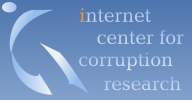
| Home → Lecture and Workshops → 2019 Passau |  |
The 2019 Workshop "The Economics of Corruption" provides graduate and PhD-students with
experimental, behavioral and institutional tools for doing research on corruption and good governance.
Recent years have seen growing skepticism towards standard methods in fighting corruption. Control and compliance have induced an ever increasing administrative burden and draw attention away from a natural tendency to obey rules and respect public interest. Novel methods of anticorruption focus on detecting the intrinsic rather than the extrinsic drivers that might motivate ethical government. Participants learn about latest experimental and behavioral research by help of lectures, games, simulations, presentations and case studies. They are confronted with detailed methods on contract penalties, limiting discretionary power, criminal enforcement, compliance systems, debarment, intermediaries, procurement, leniency and corporate liability. They are guided towards developing their own experimental design and work in groups to implement it.
PhD-students are invited to present their research (15 min. presentation + 5 min. discussion).
There are no tuition fees. The course is directed towards PhD and Master students in the social sciences (economics, business administration, psychology, political science, law, sociology) who apply experimental methods in their respective fields and would like to exchange ideas across disciplinary boundaries.
Date: September 22-29, 2019
Please find the program here. The schedule of presentations by the various PhD-students will be made available here.
Guest presentations complement the program:
Prof. Dr. Rupert Sausgruber , Wirtschaftsuniversität Wien, Honesty, Compliance, and Non-Discrimination
Prof. Dr. Gari Walkowitz , Technische Universität München, Moral Hypocrisy: Prevalence, Economic Consequences, and Counter Measures
Apart from these guest presentations the event consists of lectures, case studies, group discussions and games. The course is restricted to successful applicants (see information below).
For registration please send an email to our supporting staff . Master students from Passau must also register by email, turning in their name and major.Venue: University of Passau, Germany
Requirements: PhD-students and advanced scholars are invited to present their research. While studies from the field and the laboratory are most welcome, we also accept research on survey work and applied theory.
Prospective participants must apply by completing the application form. Please send your application to our supporting staff.
Applications will be evaluated on the basis of the academic background, motivation and, if submitted, the quality of research.
While participation is free of charge, we do not provide funding for travel or lodging. Course material will be made available online. 30 EUR will be collected to cover expenses for two social events and the games.
Exam: A final exam is offered on Oct 2, 2019. Two tutorials will be offered in advance of the exam. Master Students receive 7 ECTS credit points, based on a memo that describes the group's research findings (30%) and the exam (70%). 5 ECTS or 10 ECTS can be obtained for particular study programmes and for a reduced or amended workload.
Accommodation: The City of Passau provides all ranges of accommodation. A list of selected hotels including prices and contact information is available here (Excel-File). You may also go the webpages of the Passau Tourist Information. Participants are required to arrange accommodation on their own.
|
- Lambsdorff, J. Graf (2007) The New Institutional Economics of Corruption and Reform: Theory, Evidence and Policy. Cambridge University Press
- Lambsdorff, J. Graf (2009), The Organization of Anticorruption - Getting Incentives Right. In: Corruption, Global Security, and World Order, ed. by R. Rotberg, (The Brookings Institution Press: Washington, D.C., 2009): 389-415.
- Serra, D. and L. Wantchekon (2012) New Advances in Experimental Research on Corruption, Research in Experimental Economics volume 15, Emerald Group Publishing.
- Lambsdorff, J. Graf (2015), Preventing Corruption by Promoting Trust – Insights from Behavioral Science. University of Passau, Version: Diskussionsbeitrag Nr. V - 69 - 15

